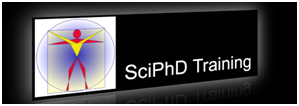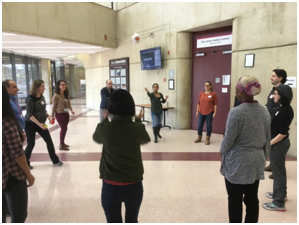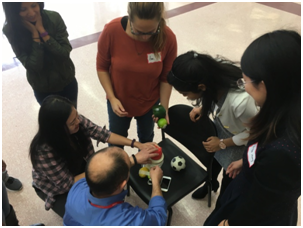 This past February, nearly fifty graduate students and post-docs braved the winter weather and attended a four day long workshop called SciPhD to learn how to frame skills gained in academia to be marketable towards careers in industry.
This past February, nearly fifty graduate students and post-docs braved the winter weather and attended a four day long workshop called SciPhD to learn how to frame skills gained in academia to be marketable towards careers in industry.
The initial start date was set back a day due to Winter Storm Niko, but this did not deter the attitudes of the program attendees who were eager to learn the skills that would someday help them land the job. SciPhD is a program run by Randall Ribaudo, Ph.D. and Larry Petcovic, M.S. (interviewed in a previous post here). The website describes: “SciPhD provides training for scientists who want to transition from academia to non-academic careers. Various workshops, boot camps and certificate programs are designed to offer resources and hands-on training to identify and develop skills in communication, leadership, negotiation, team-building, networking, and project management.” Between the two of them, Randy and Larry have extensive experience as academic and industry scientists, and are able to provide helpful perspectives regarding such career transitions. Day 1: Program Overview and Defining Expectations The program began by setting a good example for how any successful business project should begin: by providing an overview, setting goals and defining expectations. This interactive activity gave us a chance to share our interests and needs, and allowed Larry and Randy to tailor the workshop accordingly. Day 2: Effective Communication After the introduction in day 1, we began day 2 by completing a Myers & Briggs personality test which identified our 4 letter code describing if we are extroverted or introverted, sensing or intuitive, thinking or feeling, and judging or perceiving. What I enjoyed about this was not only getting my own results, but trying to retake the test with the mindset of another’s personality with the goal of yielding a different 4-letter code. The underlying message behind this exercise was “putting yourself in someone else’s shoes,” which ultimately helps you better approach working with people of different personalities. Without a doubt, this is a skill that industry professionals use on a daily basis.  We also learned the "M&M" trick. Ph.D. students are quick to answer when they are posed a question. They are like this for a reason: people come to scientists with questions and they expect answers. We are the experts and should not waver, especially during our “life-or-death” thesis defenses. We are trained to be this way! However, this behavior can come off as abrasive, especially during a non-technical conversation, such as some parts of the interview process. There is benefit in pausing, taking a minute to think about the question being posed, eat an M&M perhaps, and then respond. Even responding with a question is encouraged! The purpose of this is to truly understand the question and engage in conversation, rather than spitting out an answer like a robot. Day 3: Team/Business Building and Networking We started out with a physical group activity that mimicked what work in industry is like. We were given an array of objects, ranging from a roll of tape to a pepper and were told to toss the objects to each other in a certain order. After we mastered that, increasingly more difficult tasks were assigned to us. The pressure was on—we were competing against other groups to complete the tasks in the fastest amount of time. Another challenge was when new members were added to our team after we had already mastered the task at hand. Training a new person required time and patience! Needless to say, this activity required us to use innovation, creativity and communication—and we had a lot of fun doing it. The team-building activity was my favorite part of the workshop. The analogies that I could draw between this practice and real-world industry work enlightened me. Both scenarios involve carrying out a project with multiple people and moving parts. This simple activity gave me a deeper perspective of why effective communication and project management are key factors in nurturing innovation and success, even while throwing around tape and peppers. We next broke off into groups and set out to build biotech companies, complete with brainstorming sessions and flowcharts. We took the morning’s physical activity and applied it to a more relevant, biotech-related project by developing a business plan and presenting it to the class.
We also learned the "M&M" trick. Ph.D. students are quick to answer when they are posed a question. They are like this for a reason: people come to scientists with questions and they expect answers. We are the experts and should not waver, especially during our “life-or-death” thesis defenses. We are trained to be this way! However, this behavior can come off as abrasive, especially during a non-technical conversation, such as some parts of the interview process. There is benefit in pausing, taking a minute to think about the question being posed, eat an M&M perhaps, and then respond. Even responding with a question is encouraged! The purpose of this is to truly understand the question and engage in conversation, rather than spitting out an answer like a robot. Day 3: Team/Business Building and Networking We started out with a physical group activity that mimicked what work in industry is like. We were given an array of objects, ranging from a roll of tape to a pepper and were told to toss the objects to each other in a certain order. After we mastered that, increasingly more difficult tasks were assigned to us. The pressure was on—we were competing against other groups to complete the tasks in the fastest amount of time. Another challenge was when new members were added to our team after we had already mastered the task at hand. Training a new person required time and patience! Needless to say, this activity required us to use innovation, creativity and communication—and we had a lot of fun doing it. The team-building activity was my favorite part of the workshop. The analogies that I could draw between this practice and real-world industry work enlightened me. Both scenarios involve carrying out a project with multiple people and moving parts. This simple activity gave me a deeper perspective of why effective communication and project management are key factors in nurturing innovation and success, even while throwing around tape and peppers. We next broke off into groups and set out to build biotech companies, complete with brainstorming sessions and flowcharts. We took the morning’s physical activity and applied it to a more relevant, biotech-related project by developing a business plan and presenting it to the class. 
 That evening, we had the opportunity to participate in a networking event and talk to several individuals from industry. Their insight provided us with genuine perspectives of what working in industry is actually like and we were able to glean helpful tips regarding the job search process. It was truly an eye-opening experience to be able to take what Randy and Larry had taught us thus far, and confirm those ideas from conversations with actual Ph.D.-level scientists working in industry. Day 4: Finances and Workshop Conclusion The morning of Day four, we were thrown head-first into the world of finances. After an introduction to the terms and concepts, we were assigned roles of different financial players in the biotech world, such as government agencies, non-profits and start-ups. We were tasked with making deals with other organizations in order to manage our finances. Admittedly, I had no idea what I was doing during this activity, which further underlined the complexity of industry finances and my need to sharpen this understanding prior to entering the biotech workforce. Each day concluded with a
That evening, we had the opportunity to participate in a networking event and talk to several individuals from industry. Their insight provided us with genuine perspectives of what working in industry is actually like and we were able to glean helpful tips regarding the job search process. It was truly an eye-opening experience to be able to take what Randy and Larry had taught us thus far, and confirm those ideas from conversations with actual Ph.D.-level scientists working in industry. Day 4: Finances and Workshop Conclusion The morning of Day four, we were thrown head-first into the world of finances. After an introduction to the terms and concepts, we were assigned roles of different financial players in the biotech world, such as government agencies, non-profits and start-ups. We were tasked with making deals with other organizations in order to manage our finances. Admittedly, I had no idea what I was doing during this activity, which further underlined the complexity of industry finances and my need to sharpen this understanding prior to entering the biotech workforce. Each day concluded with a mock interview. This was my least favorite part (please excuse my dry sense of humor). I dreaded this practice not because of doubt in its value—on the contrary I think it was extremely valuable—but because of the challenging questions that I did not feel prepared to answer. My brain was not used to answering such tough questions on the spot! Good thing these were only mock interviews otherwise I would have gotten four straight rejections! All joking aside, these sample questions were great to have. Debriefing with my mock “interviewer” afterwards helped us brainstorm better answers and I got some really valuable feedback. By the time I get to real-world interviews, I am confident that I will be prepared with several offer-worthy answers. As the workshop came to an end, we revisited our expectations list and debriefed on what we had learned about each item on the list. We were also sent home with a SciPhD manual, a certificate, and several other valuable resources. Now, a few months out from the program, what I take away most from it is keeping my eyes open to experiences that could be applicable in an industry setting. I have since experienced a time when I have had to use negotiation skills. I have practiced my project management skills by mapping out experiments and identifying potential risks and pieces where I will depend on other people to get the job done. I may have eaten an M&M or two during a conversation….and I have DEFINITELY worked with others who have different personalities than myself and have thought about how to better communicate with them. Day by day, I see how my experiences in academia are contributing to my growth and will someday transfer over to a position in a biotech company. If you were an attendee of this year's SciPhD program, or a previous one, please share your opinions in the comments below! Also of interest may be a similar post about a previous SciPhD session held at Rutgers.
mock interview. This was my least favorite part (please excuse my dry sense of humor). I dreaded this practice not because of doubt in its value—on the contrary I think it was extremely valuable—but because of the challenging questions that I did not feel prepared to answer. My brain was not used to answering such tough questions on the spot! Good thing these were only mock interviews otherwise I would have gotten four straight rejections! All joking aside, these sample questions were great to have. Debriefing with my mock “interviewer” afterwards helped us brainstorm better answers and I got some really valuable feedback. By the time I get to real-world interviews, I am confident that I will be prepared with several offer-worthy answers. As the workshop came to an end, we revisited our expectations list and debriefed on what we had learned about each item on the list. We were also sent home with a SciPhD manual, a certificate, and several other valuable resources. Now, a few months out from the program, what I take away most from it is keeping my eyes open to experiences that could be applicable in an industry setting. I have since experienced a time when I have had to use negotiation skills. I have practiced my project management skills by mapping out experiments and identifying potential risks and pieces where I will depend on other people to get the job done. I may have eaten an M&M or two during a conversation….and I have DEFINITELY worked with others who have different personalities than myself and have thought about how to better communicate with them. Day by day, I see how my experiences in academia are contributing to my growth and will someday transfer over to a position in a biotech company. If you were an attendee of this year's SciPhD program, or a previous one, please share your opinions in the comments below! Also of interest may be a similar post about a previous SciPhD session held at Rutgers.